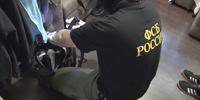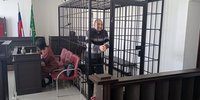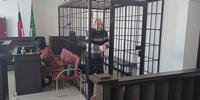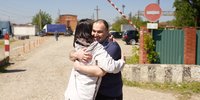The Case of Siyukhov in Maykop
Filter
- #
Zaurbiy Blyagoz, Senior Investigator for Particularly Important Cases of the Investigative Directorate of the Investigative Committee of Russia for the Republic of Adygea, initiates a criminal case under Part 1 of Article 282.2 of the Criminal Code of the Russian Federation against Inver Siyukhov.
According to the investigation, Inver Siyukhov "committed actions of an organizational nature ... expressed in holding meetings using the Internet through the Internet application "Telegram" and mobile applications "Zoom" and "JW-Library".
- #
Searches are conducted at at least 5 addresses of believers in Maykop, after which several people, including Inver Siyukhov, are taken away for interrogation. After interrogation, he is placed in a temporary detention facility.
- #
The Maykop City Court decides to choose a measure of restraint for the believer in the form of detention. Inver is sent to pre-trial detention center No. 2 in the Republic of Adygea in the village of Tlyustenkhabl. He is placed in a cell where there are 5 beds for 7 people. Prisoners are forced to sleep in turns.
- #
- #
A court hearing is being held as a measure of restraint for Inver Siyukhov. The judge asks the investigator why he does not release the accused under house arrest. The investigator explains that, in his opinion, the believer can go into hiding. The court decides to extend Inver's detention in the pre-trial detention center until August 15, 2021.
- #
It becomes known that the PFRSI (pre-trial detention facility) in which Inver Siyukhov is located is a subdivision of the correctional colony No. 1 of strict regime in the village of Tlyustenkhabl, about 110 km from Maikop. Letters of support to the believer can be sent by regular mail.
The lawyer reports that Inver received only two letters, the rest are not given to him. The believer also asked for vaccination against COVID-19 and hepatitis B, but was refused. Despite all the difficulties, Inver is in good emotional and physical shape.
Siyukhov's case is transferred to the Maykop City Court of the Republic of Adygea for consideration on the merits. It is appointed to Judge Bella Stash. About two weeks earlier, at the request of the investigator, the Maykop court limited the time for the believer to familiarize himself with the materials of the criminal case. According to paragraph 3 of Article 217 of the Code of Criminal Procedure, "the accused and his defense counsel may not be limited in the time necessary for them to familiarize themselves with the materials of the criminal case."
- #
32 people come to the courthouse to support Inver Siyukhov. They are not allowed to attend the hearing, citing the risk of spreading COVID-19 infection.
The court grants the defendant's request for his sister to join the case as a public defender.
After the prosecutor has read out the charges, the lawyer asks him to clarify which actions of Siyukhov constitute a crime.
The investigation considers it illegal to hold worship services, store unbanned religious literature and discuss it with fellow believers, as well as visit the website of Jehovah's Witnesses, which is blocked in the Russian Federation.
The believer does not admit his guilt.
- #
The court interrogates a classified witness. According to his testimony, Siyukhov's organizational role boils down to announcing speakers at services, asking someone to set up equipment, buying SIM cards and saying how much money was raised to help fellow believers.
The lawyer draws the court's attention to the discrepancy in the testimony of the witness: during the investigation, he stated that he attended the services until about July 2019, and during the trial he states that he stopped attending them in April 2018.
The witness states that he can only characterize Siyukhov positively and admits that there were no extremist calls and actions on the part of the defendant. In addition, he explains to the court that LRO is a legal concept, but simply Jehovah's Witnesses is a religion.
- #
Interrogation of another secret witness who states that the defendant discussed the Bible with him. The witness is confused in the testimony and answers uncertainly, with long pauses. For example, when asked how he realized that in the dock was the same man who talked to him about the Bible, Ivanov says: "I think it's him."
The lawyer notes discrepancies with the testimony in the record of the witness's interrogation. According to the affidavit, the conversation took place in October 2020, but the witness states before the court that they communicated in April 2021. The witness calls the defendant's phone number from memory, and later states that he never called Siyukhov and lost his number a month before the trial.
After a series of questions to the witness, the lawyer notes: "The testimony you give within 10 minutes differs by 180 degrees. Why is this happening?"
- #
The lawyer visits Inver in the pre-trial detention center at colony No. 1 in the Republic of Adygea. The believer is kept in a 4-bed cell with another prisoner. The lawyer reports that Inver recently suffered a serious respiratory illness. The administration of the detention center stopped sending him letters sent by his friends and acquaintances. Inver says that court hearings were postponed several times due to repairs in the Maykop temporary detention facility, where he cannot be transferred for the duration of the hearings.
- #
Inver Siyukhov's detention is extended.
Two prosecution witnesses are being questioned. They characterize the believer positively and confirm that they have never heard from him statements degrading the dignity of representatives of other religions, confessions, nationalities, have never noticed aggression and violence on his part against anyone.
- #
The lawyer asks to exclude from the list of evidence the conclusion of the expert R. V. Levinsky as inadmissible, since it was drawn up in violation of the requirements of the legislation of the Russian Federation. According to the defense, the expert gave a legal assessment of Siyukhov's actions, which is exclusively within the competence of the court. The prosecutor asks to postpone the consideration of the petition in order to agree with the management on the position on this issue.
- #
The judge grants the defense's request to attach documents that explain that the ban on a legal entity does not mean a ban on the religion of Jehovah's Witnesses and, accordingly, their right to worship and spread their beliefs. Among them are the decision of the Supreme Court of the Russian Federation, the conclusion of the state religious examination and others.
- #
The lawyer asks to attach a number of medical documents that indicate the presence of serious chronic diseases in the parents of Inver Siyukhov.
The court begins consideration of the case materials.
The public defender and the defendant take turns reading out excerpts from the printed publications seized during the search. Among the topics touched upon: "Why is it necessary to respect authority?", "How to show modesty in dress and appearance", "Avoid desecrating deeds and habits", "How to create a strong family", "Avoid speech and behavior that dishonor marriage".
At the request of the public defender, the judge adds ECtHR rulings, OSCE statements, and the views of the Working Group on Arbitrary Detention concerning Jehovah's Witnesses.
- #
Material evidence is being examined in court.
- #
More than 40 people come to the hearing, but only six are allowed into the courtroom, in addition to Inver Siyukhov's relatives. The Court continues to review excerpts from Jehovah's Witnesses publications and the Bible.
- #
The court is watching three films about alternatives to blood transfusions, in which well-known surgeons from different countries talk about the features of bloodless surgery.
Before screening, the public defender draws the court's attention to the fact that the first film in this series won three prizes at the 34th annual American International Film and Video Film Festival.
There are also two cartoons made by Jehovah's Witnesses.
- #
The court hearing is held via videoconferencing and is attended by about 20 people. The defendant draws the attention of the participants in the trial: "History shows that the persecution of Jehovah's Witnesses in the Soviet Union and in Russia only contributes to the strengthening of their faith and numerical growth."
The lawyer petitions for mitigation of the measure of restraint for Inver Siyukhov, who has been in jail for more than 1.5 years, but the court rejects the petition.
- #
Prosecution witnesses are being questioned. The judge rejects the motion of the defense to interrogate Nikolai Saparov, who could confirm that part of the testimony of one of the witnesses is not true.
- #
The judge rejects the petition to exclude the examination of the psychologist-linguist Ruslan Levinsky as material evidence. However, he grants the request of the state prosecutor to invite this expert for questioning.
Testifying in court, Inver Siyukhov draws attention to numerous violations during the search of his home. For example, the witnesses entered the house only 15 minutes after the start of the search, the FSB officers dispersed around the apartment, and Inver did not see what exactly was seized from him. He notes that the sequence of actions described in the protocol is not true.
Material evidence, including two films, is being examined. The first is called "The Bible: A Life-Changing Power," and the second is about Jehovah's Witnesses.
- #
Expert Levinsky is being interrogated. Counsel asks him about the methods and purposes of the examination. The expert admits that there is no single methodology for conducting an examination, and he does not know about its goals.
During the interrogation, it turns out that Levinsky does not have the education necessary to conduct a psycholinguistic examination. He completed it in August 2021, and received his religious education only in November. Levinsky cannot define the term "local religious organization" (LRO) and explains that he used it "based on the fact that the investigator used it." Also, he cannot name signs that Siyukhov continued the activities of the LRO of Maykop, despite the fact that such a conclusion was made in the expert opinion.
The defense draws the court's attention to the fact that Levinsky's answers to these questions are critically important for the defendant.
- #
The interrogation of the expert continues. He finds it difficult to answer many questions.
The lawyer reads out the response from the Commission of Specialists of the Guild of Experts on Documentation and Information Disputes (GLADYS) on the preliminary analysis of Levinsky's examination, in which the experts provide evidence of many violations committed by him.
The court extends Siyukhov's arrest for another three months.
- #
The meeting is attended by 8 listeners who came to support the defendant.
The court is watching the film "Youth Issues. How do you find true friends?"
- #
Judge Bella Stash extends Inver Siyukhov's pre-trial detention until August 18, 2023. This is the ninth hearing on the extension of the measure of restraint.
The lawyer in his speech draws the court's attention to the fact that his client has been in custody for more than two years, and considers such a measure unfounded.
The public defender emphasizes that "throughout this time, there were no complaints against Inver either from the employees of the IVS or from the pre-trial detention center. And he had no attempt to escape or disobey any requirements and rules. [...] It can't be a mask. If a person is really an extremist — and extremism implies violent aggressive actions — this will definitely manifest itself."
She goes on to say that in the pre-trial detention center, Siyukhov "is considered the calmest person, other prisoners often ask him to join the cell, because he is comfortable, calm, he never forces him to anything."
The believer himself explains to the court why he asks to change his measure of restraint: "If a milder measure of restraint is chosen for me, then is it bad that I will continue to act in a good way like a believer? Otherwise, I would be a religious hypocrite, but worse, a traitor to the Almighty."
Prosecutor Orlova, after all that has been said, asks the court to leave the measure of restraint in the form of detention. The court supports the prosecution.
The defense again interrogates the expert Ruslan Levinsky, who answers all questions with vague wording. State prosecutor Inessa Orlova asks the court to reject many questions from the defense.
- #
This is the fourth time the court has questioned expert Ruslan Levinsky. He often says that he took the wording of the answers in the examination from the questions posed by the investigator. The judge and the state prosecutor reject questions to the expert from Inver Siyukhov and his lawyer.
- #
The defense makes additions to the petition to exclude the examination of Ruslan Levinsky from the case file. The lawyer notes that the expert does not have the necessary linguistic and religious education. The defense also draws attention to procedural violations committed during the examination.
- #
The court is reviewing discs of 2014 reports on biblical topics, including a speech on "God's Word Is Useful for Instruction in Righteousness."
- #
At the end of watching the videos, the lawyer concludes that the purpose of such events is to obtain the "spiritual refreshment, encouragement" that followers of the religion of Jehovah's Witnesses seek.
The lawyer draws the court's attention to the fact that during the listening to the audio recording, the name "World Organization of Jehovah's Witnesses" is mentioned, which refers to the entire community of Witnesses, whose number number is more than 8 million people in the world. He continues: "And not once during those 4 hours and 16 minutes is there any mention of the Administrative Center of Jehovah's Witnesses or any of the local religious organizations."
- #
The court screens films about the contemporary history of Jehovah's Witnesses.
- #
At the hearing, quotations from the Bible and fragments from publications based on it are examined.
- #
The court is examining a book about the history of Jehovah's Witnesses.
- #
The court grants the defense's request to summon investigator T. N. Pshipego for questioning.
- #
Inver Siyukhov was placed in a punishment cell for 15 days. "For almost three years of my stay in the PFRSI, I have never been reprimanded, warned or reprimanded," the believer himself comments. "On the contrary, I was held up as an example to other cellmates."
- #
At the hearing, the defendant's correspondence with fellow believers in the messenger is selectively read out and other materials are examined. The defense asks to recognize the results of operational-search measures as inadmissible, since, in its opinion, they were obtained with violations. The court refuses.
The expert opinion of religious scholar Ekaterina Elbakyan is announced. The judge attaches him to the case file, but refuses to interrogate the religious scholar via video conferencing. Then Inver Siyukhov begins to testify.
About 40 people are outside the courthouse to support the believer. Eight of them are allowed to attend the hearing.
- #
Prosecutor Inessa Orlova asks to sentence Inver Siyukhov to 9 years in prison in a penal colony and 2 years of restriction of freedom. Speaking in the debate, the defendant states that the prosecution has not presented any evidence that anyone suffered from his actions.
- #
"Can the manifestation of love, kindness and empathy for others be called extremism?" Inver Siyukhov speaks with the last word.
The last word of the defendant Inver Siyukhov in Maykop - #
Inver Siyukhov is kept in a 4-bed cell, he enjoys the respect of other prisoners. The believer receives letters of support and prepares for an appeal. He has the ability to read the Bible.
- #
Supreme Court of the Republic of Adygea (32 Zhukovsky Street, Maykop). Time: 10:00.
- #



